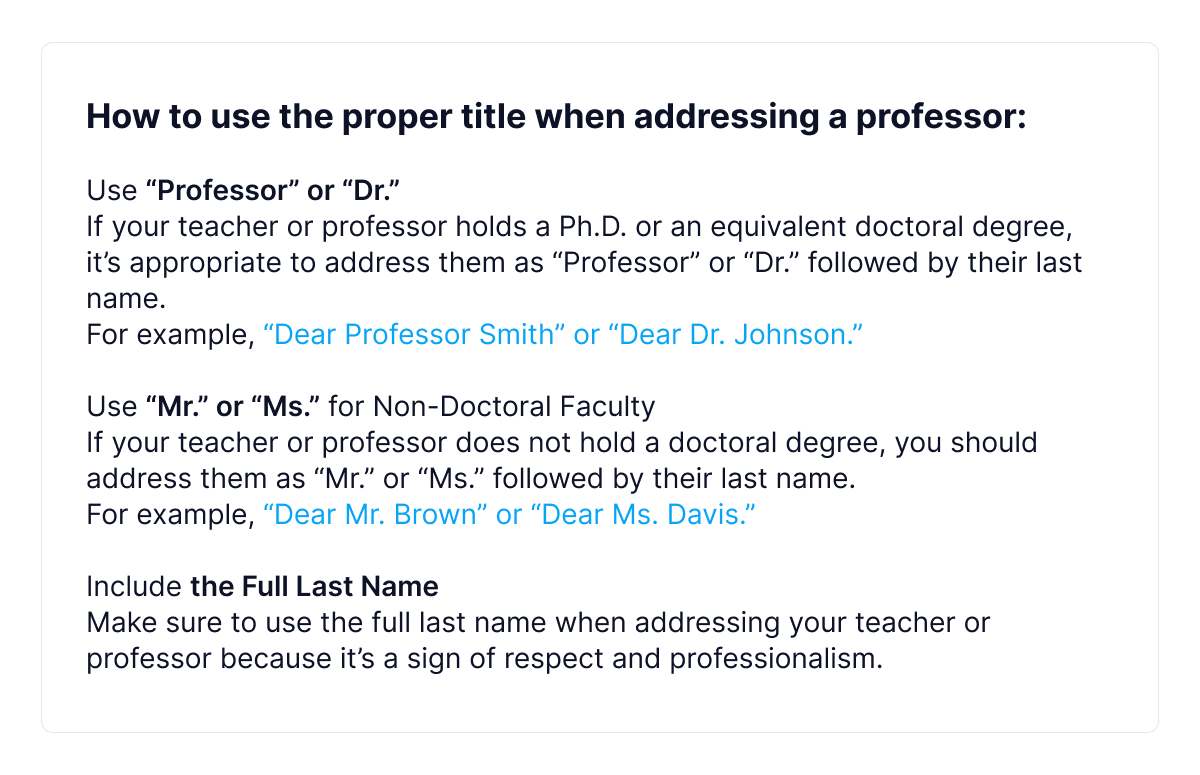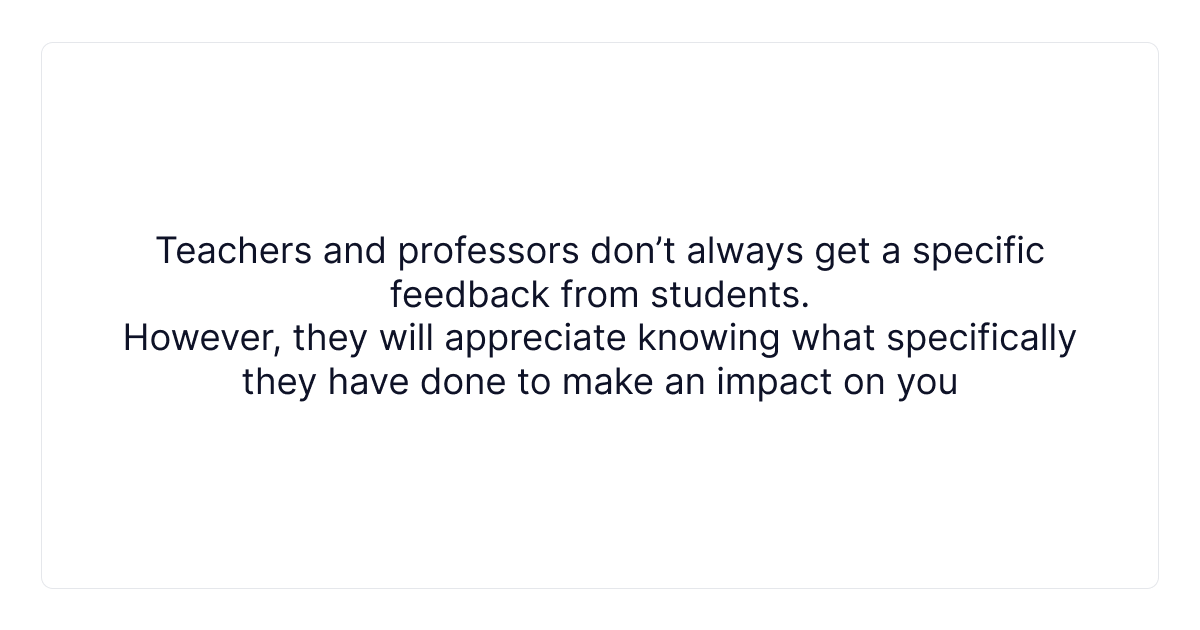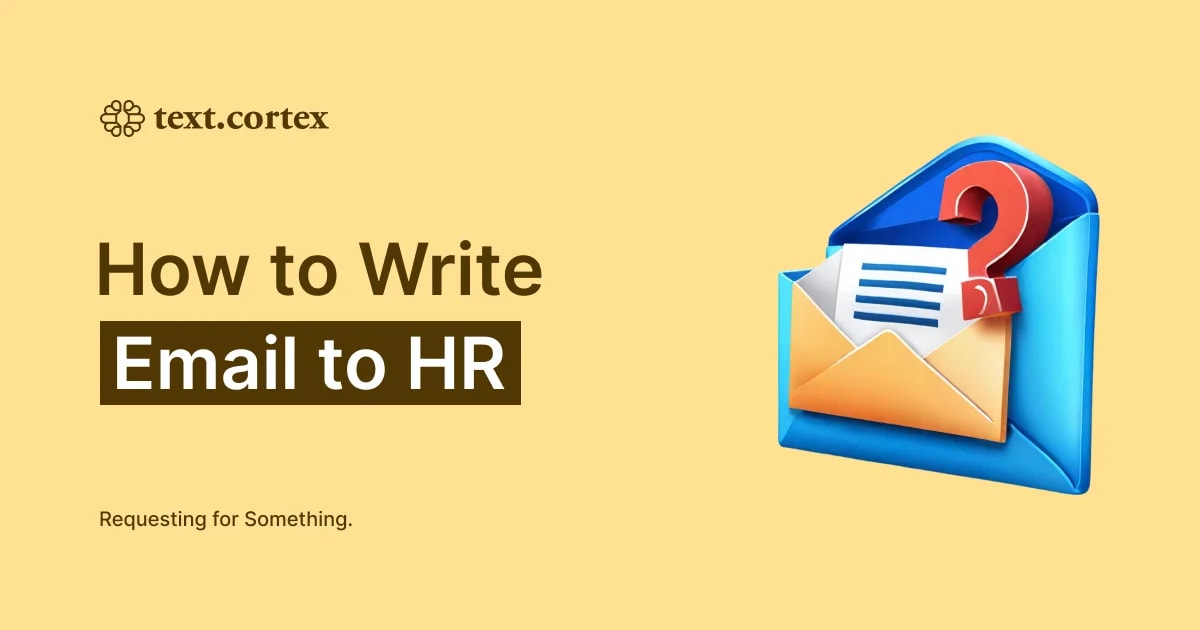Professors often play a pivotal role in shaping our academic experience and personal growth.
Their guidance, mentorship, and support can be invaluable, and it's only fitting to express our appreciation for their dedication. This is where a thank-you email steps in.
While it may seem like a simple gesture, a well-composed thank-you email can leave a lasting impression and foster positive relationships with your professors.
Whether you're thanking them for a recommendation letter, valuable advice, or assistance, this blog post will guide you through crafting the perfect thank-you email.
So, let's see how to write a thank-you email to a professor in a professional and heartfelt manner.
What is A Thank-You Email to a Professor?
A thank-you email to a professor should be a formal and respectful message expressing your appreciation for their guidance, support, or assistance.

The Top 5 Reasons to Write a Thank-You Email to a Professor
1. Expressing Gratitude
Professors invest their time and knowledge in their students.
Therefore, writing a thank-you email is a way to acknowledge their effort and show appreciation for their dedication to your academic and personal growth.
2. Acknowledging Support
Professors often provide support in various forms, such as mentorship, recommendation letters, research assistance, or insightful guidance.
A thank-you email allows you to recognize and thank them for the specific ways they've helped you.
3. Building Professional Relationships
Demonstrating gratitude through a thank-you email is an excellent way to build and maintain positive relationships with your professors.
Moreover, such connections can be valuable for networking, seeking advice, or future collaboration.
4. Enhancing Your Image
Sending a well-crafted thank-you email showcases your professionalism and courtesy.
In addition, it leaves a positive impression and demonstrates your commitment to respectful and appreciative communication.
5. Motivating Educators
Your thank-you email can motivate professors, and by recognizing their impact and contributions, you can inspire them to continue their excellent teaching and mentorship.
How to Write a Thank-You Email to a Professor in 7 Steps?
Before we dig deeper into all the steps, an overall tip we can give you is to be sincere and specific- say how a professor has helped you and how they positively influenced you.
Step 1: Craft a Concise Subject Line
Choose a subject line that clearly conveys the purpose of the email.
✨ Examples:
"Thank You for Your Mentorship,"
"Appreciation for Your Support,"
"Gratitude for Recommendation Letter,"
Step 2: Properly Address The Professor
When addressing a professor in a thank-you email, using the appropriate title is important.
Thus, the title you should use typically includes their academic or professional designation.

Naturally, a lot will depend on your relationship with the teacher - Some teachers prefer a less formal way of addressing them and even insist on a first-name basis.
Step 3: Express Your Gratitude & Personalize Your Message
Begin the email by expressing your sincere thanks for their help, guidance, or support. Furthermore, be specific about what you're thanking them for and include any memorable moments or insights you gained.
In other words, steer away from generic sentences but say how actually the professor helped you, inspired you, motivated you, etc.

✨ Examples:
- Gratitude for Teaching and Support:
"I want to express my heartfelt gratitude for your exceptional teaching and support throughout the semester. Your dedication to helping your students understand complex concepts has been invaluable to me."
- Gratitude for Mentorship:
"I am incredibly thankful for your mentorship during my research project. Your guidance and insights have not only improved my research but have also inspired me to pursue a deeper understanding of the subject."
- Gratitude for a Recommendation Letter:
"I wanted to thank you for taking the time to write a recommendation letter on my behalf. Your support played a crucial role in securing [mention the specific opportunity], and I deeply appreciate your help."
- Gratitude for Going Above and Beyond
"I am grateful for your willingness to go above and beyond to assist me during the [mention the specific situation or project]. Your generosity in sharing your time and knowledge has had a significant impact on my academic journey."
- Gratitude for Personal Growth:
"I want to thank you for pushing me to reach my full potential. Your encouragement and constructive feedback have not only improved my understanding of the subject matter but have also contributed to my personal growth."
- Gratitude for Empowering Opportunities:
"I can't express how thankful I am for the opportunities you've provided, such as [mention specific opportunities or projects]. These experiences have been instrumental in shaping my academic and professional path."
- Gratitude for Accessible Support:
"Your accessibility and willingness to provide assistance whenever I had questions or needed help made a world of difference in my learning experience. I appreciate your approachability and dedication to your students."
Overall, be specific and personal in your expressions of gratitude, as it demonstrates that you've put thought into your message and that your appreciation is genuine.
💡Tip: Express enthusiasm and appreciation genuinely. Let the professor know that their support made a meaningful difference to you.
Step 4: Keep it Concise
Since professors are often busy, keep your email focused and avoid unnecessary details or lengthy explanations.
Step 5: Future Intentions
If you're open to it, offer to maintain a future connection and express your enthusiasm for continuing to work with the professor or learning from them in the future.
Thus, show your eagerness to maintain a positive relationship.
Step 6: Closing and Signature
Close the email professionally with a closing phrase like "Sincerely" or "Best regards," followed by your full name.
Furthermore, include your contact information in your email signature in case the professor wants to respond.
✨ Examples:
"Sincerely,"
“With appreciation,”
"Respectfully,"
“Yours in gratitude,”
“Thankfully,”
"Warm regards,"
"Best regards,"
"Yours sincerely,"
Step 7: Proofread Your Email
A well-proofread email demonstrates professionalism and respect for your professor.
Furthermore, it shows that you take communication seriously and have put effort into making it clear and error-free.
Typos, grammatical errors, or missing words can lead to miscommunication or misunderstandings.
Therefore, proofreading your email helps you catch and correct such errors, preventing any confusion.
💡ProTip
The AI-powered solution, TextCortex, amongst its many features, also offers a spelling and grammar checker to catch embarrassing mistakes, such as misspelled words, incorrect grammar, or awkward phrasing.
4 Examples of Genuine Thank-You Emails to a Professor
Example 1: A Thank-You Email Expressing Gratitude for a Professor’s Support
Subject: Thank You for Your Support
Dear Professor [Last Name],
I hope this email finds you well. I want to express my heartfelt gratitude for your support and guidance during [specific context, e.g., the research project in your class / the recommendation letter process]. Your expertise and dedication have had a profound impact on my academic and personal growth.
I especially appreciate your [mention specific instances, e.g., insightful lectures on [topic] / the time you spent helping me with my research proposal / your valuable recommendation letter]. Your mentorship has not only deepened my understanding of the subject matter but also inspired me to pursue further studies in this field.
I would be honored to stay in touch and continue learning from your wisdom. Please feel free to reach out if there's ever an opportunity for collaboration or further guidance.
Once again, thank you for your support and mentorship. I look forward to crossing paths with you in the future.
Sincerely,
[Your Full Name]
[Your Contact Information]
Example 2: A Thank-You Email Expressing Gratitude for Mentorship
Subject: Thank You for Your Help and Guidance
Dear Professor [Professor's Last Name],
I hope this email finds you well. I wanted to take a moment to express my heartfelt gratitude for your guidance and support throughout [mention the specific context - the semester, the research project, etc.]. Your mentorship has been invaluable to my academic and personal growth.
I appreciate your dedication to teaching and your willingness to go above and beyond to help me understand complex topics. Your passion for [mention the subject or field] is truly inspiring and has significantly impacted my educational journey.
Additionally, I want to thank you for [mention any specific acts of kindness, help, or advice they provided]. Your insights have been instrumental in [mention how their assistance benefited you or your project].
I am also grateful for your recommendation letter on my behalf [if applicable]. Your support played a crucial role in [mention the specific opportunity or achievement].
I look forward to continuing my academic journey with your guidance and support, and I am excited to learn from you in the future. Your expertise and mentorship are sources of inspiration for me.
Thank you once again, Professor [Professor's Last Name], for everything you have done for me. Your generosity and wisdom are deeply appreciated.
Please let me know if there is anything I can do to assist you or if there are any ways I can contribute to your research or projects.
Warm regards,
[Your Full Name]
[Your Student ID or Course/Program]
Example 3: A Thank-You Email Expressing Gratitude for a Recommendation
Subject: Thank You for Your Help and Guidance
Dear Professor [Professor's Last Name],
I hope this email finds you well. I am deeply grateful for your kind and generous support in writing a recommendation letter on my behalf. Your recommendation played a pivotal role in my recent success in [mention the opportunity or achievement for which the recommendation was needed, e.g., securing an internship at XYZ Company].
Your willingness to vouch for my qualifications and character means the world to me, and I'm truly honored to have had you as a mentor and advocate. Your insights and expertise undoubtedly influenced my selection for this opportunity.
I understand the effort and time it takes to craft such a recommendation, and I genuinely appreciate your dedication to my academic and professional growth. Your recommendation not only opened doors for me but also provided me with a tremendous confidence boost.
I promise to make the most of this opportunity and continue to uphold the standards and values that you've instilled in me throughout my time at [mention your institution].
Thank you once again, Professor [Professor's Last Name], for your unwavering support. Your mentorship has been a guiding light in my educational journey, and I look forward to making you proud.
Please let me know if there is any way I can assist you or support your work. I am eager to give back in any way I can.
Sincerely,
[Your Full Name]
[Your Student ID or Course/Program]
Example 4: A Thank-You Email Expressing Gratitude for an Achievement
Subject: Thank You for Helping me Accomplish [Achievement]
Dear Professor [Professor's Last Name],
I hope this message finds you well. I am writing to express my profound gratitude for your pivotal role in my recent academic achievement, specifically [mention the achievement, e.g., receiving the highest grade in the class].
Your guidance, encouragement, and unwavering support have been instrumental in helping me reach this milestone. Your commitment to teaching, engaging lectures, and willingness to provide additional assistance when needed have greatly contributed to my success in your course.
Your mentorship and the knowledge you shared with me have not only enhanced my understanding of the subject matter but have also ignited a passion for [mention the subject or field] that I had never experienced before.
I am genuinely thankful for the opportunities you have provided me and the doors you have opened through your dedication to your students. Your influence has extended beyond the classroom, and I carry the lessons I've learned from you with me as I continue my academic journey.
Once again, thank you for your support and for believing in my potential. I look forward to your continued guidance as I pursue further achievements in my academic pursuits.
If there is any way I can assist you or support your work in return, please do not hesitate to let me know. I am eager to give back and contribute to your ongoing dedication to education.
Sincerely,
[Your Full Name]
[Your Student ID or Course/Program]
How to Write a Thank-You Email to a Professor with The Help of TextCortex?
Expressing gratitude is a small gesture that can go a long way. It shows respect and appreciation and can open doors for future collaborations and opportunities.
Therefore, knowing how to write a thank-you email to a professor is a valuable skill, and a tool to help you craft a smooth and error-free mail is extremely beneficial.
Enter, TextCortex!
TextCortex is an AI writing tool that provides compatibility across over 4,000 platforms, meaning you can use it without interrupting your research.
So, how can TextCortex help you?
🔥 You can use ZenoChat, an AI chatbot with customizable personas and the advanced GPT-4 language model to create various text based on the input.
Therefore, you can create a distinct writing persona according to your preferences.
🔥 You can benefit from feature-rich rewriting tools enabling you to rewrite, paraphrase, summarize, etc., your text for that extra polish.
🔥 You can create any type of email with our bullet-to-email feature, allowing you to craft and personalize an email with only 3 bullet points in a matter of seconds.
🔥 You can check and adjust your tone by choosing from more than 10 different types of tones of voice.
🔥 You can translate your text into more than 25 languages thanks to our AI generators.
🔥 and so much more.
Curious to find out more?
Join TextCortex today and access robust features to nuance your writing skills.
.jpg)

.webp)


